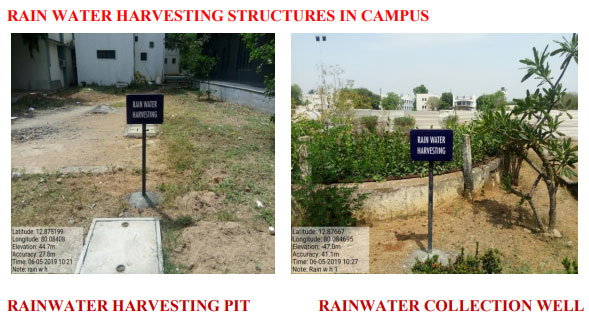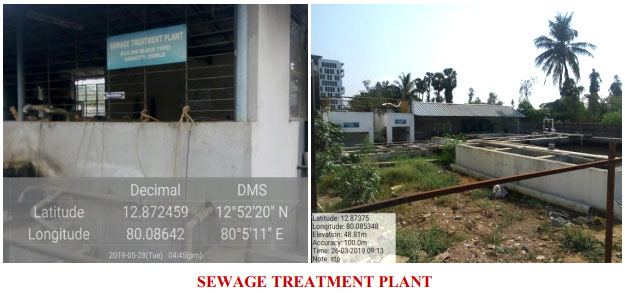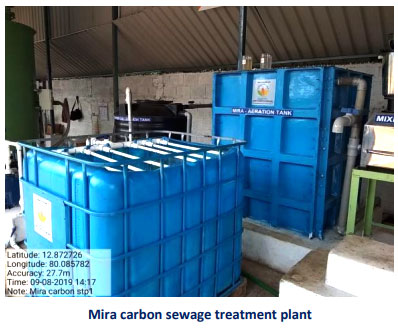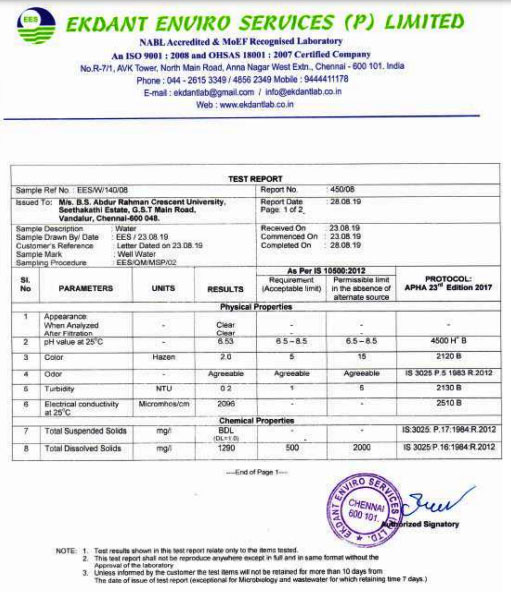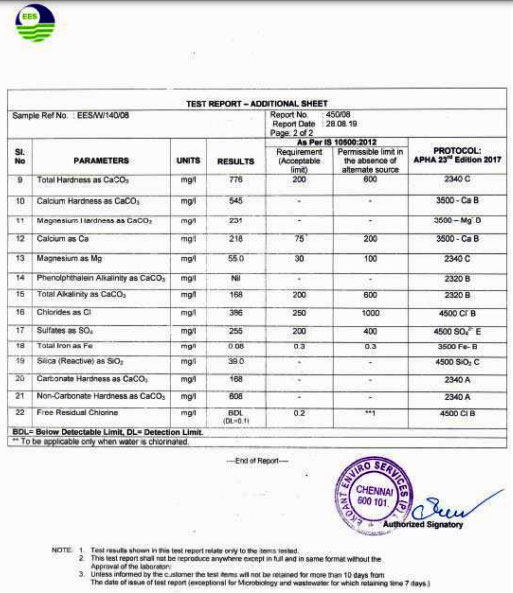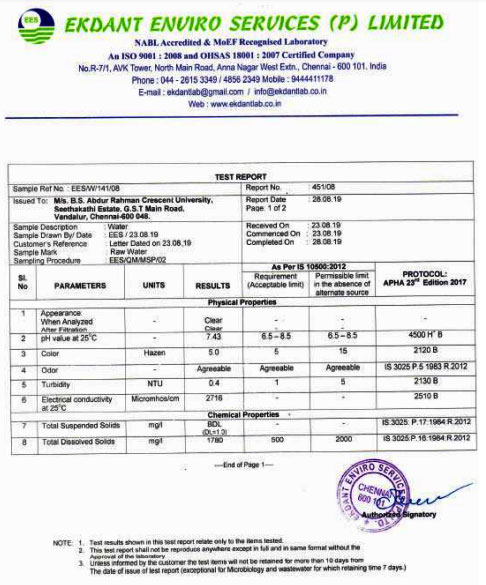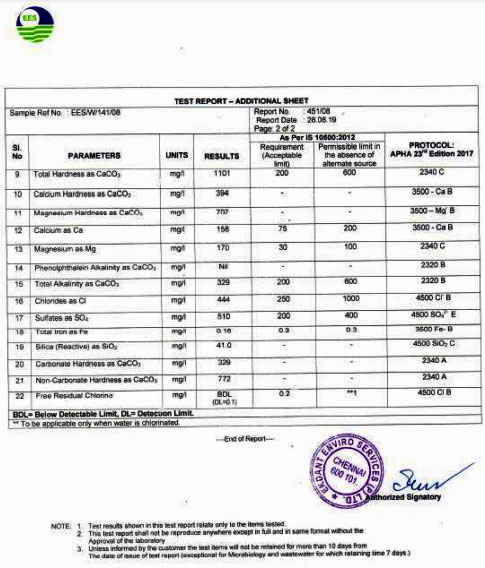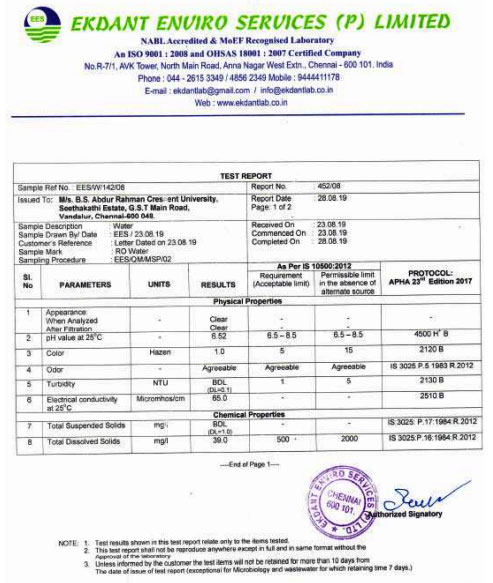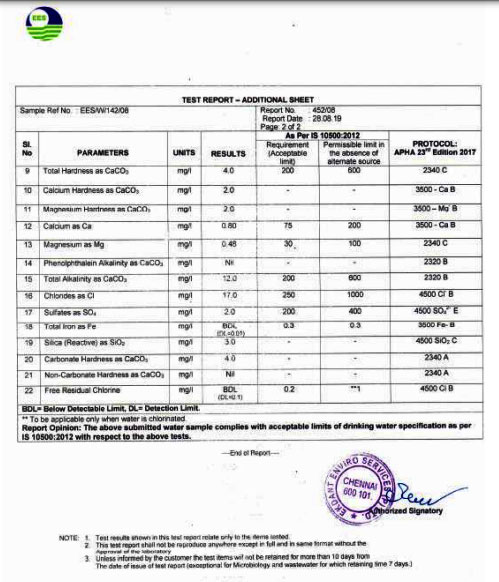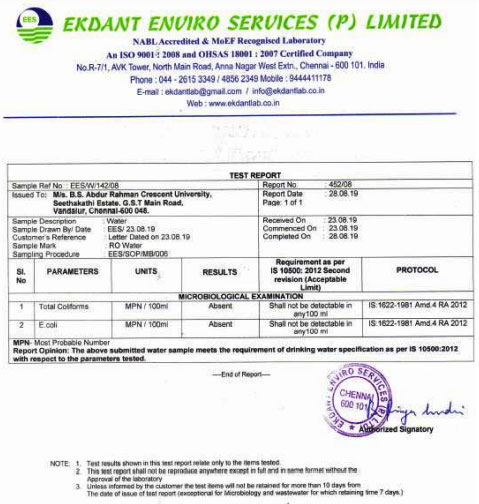Clean Water and Sanitation
B.S.Abdur Raham Crescent Institute of Science and Technology has a firm policy for water reuse. Water reuse generally denotes the process of capturing wastewater, stormwater, or greywater and treating it as required for a designated beneficial uses such as drinking, or surface or ground water replenishment. The water reuse in the Institute is looked upon in two aspects.
(i) Recylcing of the treated water from the sewage treatment plant for benefial purposes like gardening and toilet flushing
(ii) Harvesting of the Rain water
Some of the key points of the Policy is given below
Main objective : The Institute should be a Zero Dischrage campus
- Proper collection and treatment of wastewater generated in the Institute
- Regular monitoring for the quality of the treated water
- Recycling the treated water for gardeneing and toilet flushing by providing dual plumbing system
- Frequent inspection and maintenance of the STP
- Rainwater harvesting in all blocks of the Institute
- Maintenance of infrastructure facility provided for rain water harvesting
- Provision of sufficient storage structures to store rain water
- Ensuring that there are minimum wasteage of water in the campus by using advanced monitoring facilities such as sensors
- Ensuring the planting of drought tolerant plants for the water conservation
- Improving the landscapes of the Institute thereby ensuring a natural water conservation through plants
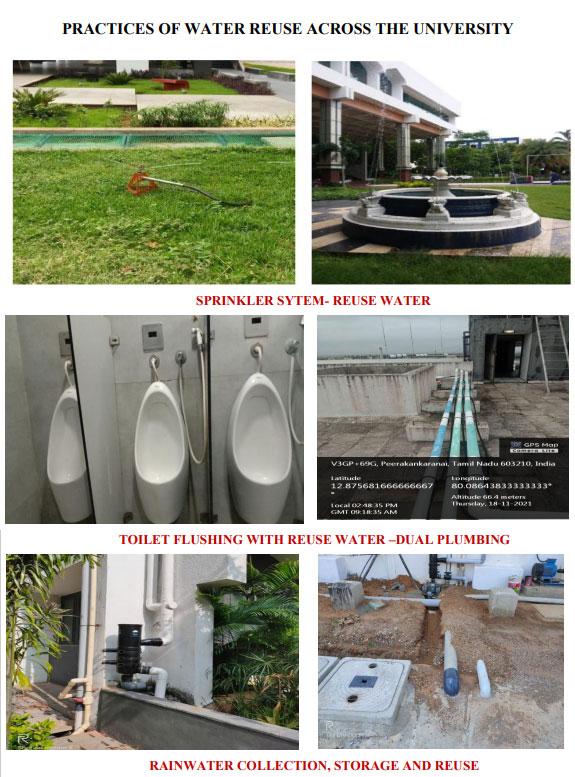
B.S.Abdur Raham Crescent Institute of Science and Technology has a firm policy to harvest the rainwater and reuse it for beneficial purposes.
RAIN WATER HARVESTING STRUCTURES AND UTILIZATION IN THE CAMPUS
- The institute has implemented rain water harvesting system in the campus with a strong desire to utilize the rain water at maximum extent
- In the forefront to save water, our institute of science and technology has initiated and executed the rainwater harvesting in the campus.
- Rainwater harvesting facility is done in all blocks to collect rainwater from the roof of all buildings
- The harvested water is diverted to open wells in institute campus, Men’s Hostel and ladies hostel
- The placement of rainwater facility within the campus is decided upon by considering the profile of the land so as to drain the maximum amount of water collected with ease
- In the buildings, sufficient plumbing connections are provided to trap the rain water from the roof tops
- Underground connections are ensured to connect the collected water from the roof top to the rainwater recharge pit
- It was also ensured that the rainwater harvesting structures are constructed as per the norms. The recharge pit provided to collect the rain water is series of filter bed
- This initiative took shape when the institute faced shortage of water during summer. Cost of buying water was becoming a financial burden. The only alternative to the water crisis was to use the available water more effectively
- The features of the recharge pit are described below
- A mesh is provided at the inlets of rain water pipes so that solid waste/debris is prevented. B.S.Abdur Rahman Crescent Institute of Science and Technology has taken initiatives to install rain water harvesting pits in the campus from entering the pit system.
- The recharge pits are of size 2m x 2m x 2m is excavated
- The recharge pit comprises different set of filter media. The filter media comprises of thick layers of boulders at the bottom followed by layers of gravels and coarse sand.
- This enables the filtration of water and also prevents the deposition of silt on the recharge pit.
- Access Manhole frames and covers are provided.
- The rain water is also stored in Underground sumps of Life Science block, Mechanical Science Block and New Staff Quarters.
B.S.Abdur Rahman Crescent Institute of Science and Technology has taken initiatives to install rain water harvesting pits in the campus.

Rainwater harvesting facility is done in all blocks to collect rain water from the terrace. The
details are listed below.Rain Water Harvesting Details S.No Inlet Pit Detail Area (sq. m) Rain water filter capacity ( Litres) Location 1 Inlet pit-1 156 200 Mechanical Science Block Inlet pit-2 122 200 Inlet pit-3 296 300 Inlet pit-4 175 200 Inlet pit-5 243 300 2 Inlet pit-1 191 200 Ladies Hostel-New Block Inlet pit-2 188 200 Inlet pit-3 132 200 3 Inlet pit-1 68 100 New Staff quarters Inlet pit-2 65 100 Inlet pit-3 81 100 Inlet pit-4 66 100 Inlet pit-5 81 100 Inlet pit-6 66 100 4 Inlet pit-1 61 100 Men’s Hostel-A&B BLOCK Inlet pit-2 71 100 Inlet pit-3 43 100 Inlet pit-4 132 200 Inlet pit-5 132 200 Inlet pit-6 43 100 Inlet pit-7 71 100 Inlet pit-8 61 100 5 Inlet pit-1 297 300 Men’s Hostel -C& D BLOCK Inlet pit-2 297 300 6 Inlet pit-1 71 100 Men’s Hostel -PG BLOCK Inlet pit-2 71 100 Inlet pit-3 71 100 Inlet pit-4 71 100 Inlet pit-5 71 100 Inlet pit-6 71 100 Inlet pit-7 71 100 Inlet pit-8 71 100 7 Inlet pit-1 275 300 Pharmacy Block 8 Inlet pit-1 340 300 Library Block Policy to treat the wastewater and reuseB.S.Abdur Raham Crescent Institute of Science and Technology has a firm policy to treat the wastewater and reuse it for beneficial purposes
LIQUID WASTE MANAGEMENT – SEWAGE TREATMENT PLANT – 500KLD- 2 nos. of Sewage treatment plants of 250KLD capacity are available, one for Men’s Hostel and one for Institute campus. The STP is of Eco-Bio Block type. The treated water is used for landscaping and toilet flushing purpose
- The sewage treatment plant is working on the principle of attached growth aerobic system (Eco-Bio bricks) followed by sand filter and carbon filter

DETAILS OF SEWAGE TREATMENT PLANTS
Location Capacity Remarks College campus 250KLD Commissioned in 2003 as a 150KLd plant. Revamped and capacity increased to 250KLD in 2015 Men’s Hostel 250KLD Commissioned in 2014 DETAILS OF WASTEWATER GENERATION AND ITS REUSE
S.No Location Total water collected Water recycled % of water reutilized 1. College campus 250 KL 220KL 90 2. Men’s Hostel 250 KL 220KL 90 MIRA CARBON SEWAGE TREATMENT PLANTOur Institute has established MIRA CARBON SEWAGE TREATMENT PLANT of 2 m3 capacity and Vermi filtration Unit in association with M/S.Kanyo Group of Companies to treat domestic wastewater generated from the Institute.
 Water Quality Report
Water Quality ReportThe water quality reports for the well water, raw water and RO water is given below
QUALITY REPORT OF WELL WATER
 QUALITY REPORT OF RAW WATER
QUALITY REPORT OF RAW WATER
 QUALITY REPORT OF RO WATER
QUALITY REPORT OF RO WATER




